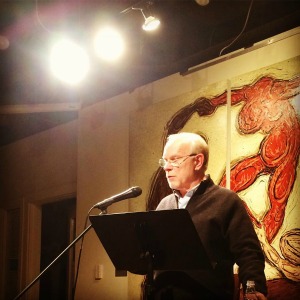Last week, The Seattle School community gathered to hear Dr. Keith Anderson, President, deliver the “State of the School” address. The annual gathering is an opportunity for students, alumni, faculty, and staff to hear an update about institutional changes, big announcements, and how the overall mission of the school is playing out in day-to-day programs and practices.
The evening also included a chili dinner provided by Student Leadership. While introducing Dr. Anderson, Elise Hale-Case, facilitator of Student Council, said that she hopes this tradition is marked by two words: transparency and engagement—transparency on the part of The Seattle School’s leadership in reflecting on the last year, and engagement on the part of the community at large, exploring how each individual plays a part in the life of the institution.
“The state of the school is best answered by your stories,” said Dr. Anderson. “What is being lived out in you and your stories? What is the mission of our alumni as they are mobilized into the world for the sake of the reign of God?”
 In assessing the successes and setbacks of the last year, Dr. Anderson said that his first question is about a deeply felt alignment to mission. “As many organizations and systems in our culture shift and drift, we ask: Are we still committed to our mission? Are we just as committed to our identity? Do we still hold the spiritual DNA which gave birth and life to this mission almost 20 years ago? We are a Christian theological graduate school—that is our identity. As we hire and assess, it is my primary responsibility to come back to those questions again and again. We are grounded in the Nicene Creed, in our mission statement of text, soul, and culture, in our scripture statement, and in our intentionality to be a place of discourse. One marker of institutional health is to be clear about who we are in our mission.”
In assessing the successes and setbacks of the last year, Dr. Anderson said that his first question is about a deeply felt alignment to mission. “As many organizations and systems in our culture shift and drift, we ask: Are we still committed to our mission? Are we just as committed to our identity? Do we still hold the spiritual DNA which gave birth and life to this mission almost 20 years ago? We are a Christian theological graduate school—that is our identity. As we hire and assess, it is my primary responsibility to come back to those questions again and again. We are grounded in the Nicene Creed, in our mission statement of text, soul, and culture, in our scripture statement, and in our intentionality to be a place of discourse. One marker of institutional health is to be clear about who we are in our mission.”
Other signs of institutional health that Dr. Anderson highlighted include: five consecutive years of sustainable enrollment growth; increasing credibility as a thought leader, marked by new and ongoing collaborations with others; record numbers of participants in The Allender Center’s programs and events; staff changes and additions, including naming Paul Steinke as the VP of Student & Alumni Development, growth in The Office of Students & Alumni and the Registrar’s office, the formation of the Institutional Support department, and the recent hire of Rev. Andrea Saccoccio as Director of Advancement; updates to Title IX and non-discrimination policies, alcohol on campus policies, and voting procedures on the Board of Directors; major revisions to The Seattle School’s core curriculum and the ongoing review of that curriculum to ensure that it best serves students and alumni and aligns with the mission of the school; and the official launch of a multi-year process of pursuing new levels of accreditation.
“I was on the road a while ago and someone said, ‘There’s something distinctive about your alumni. They don’t seem angry or bitter, but more ready to engage others in deep relationality, curious faith, and informed hope.’ I like to hear that from outside of our tent,” said Dr. Anderson in his conclusion. “I’ve given the last 10 years to labor here on behalf of students and alumni, in the name of Jesus, for the sake of the kingdom, because I believe we send people from this place with skills and courage. I’m grateful you are here. So, I say, the state of the school is strong!”

